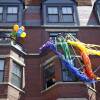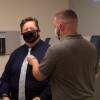After years of feeling like there wasn’t a dedicated space for LGBTQ women and nonbinary people in the Boston area, Thais Rocha decided to start promoting events herself.
“I never really found myself being in a place where I felt like I really liked the space,” said the 33-year-old co-founder of LGBTQ Nightlife Events , which has been hosting events since 2016. “I was like, ‘What’s stopping me from doing this myself?’ And that’s where the idea really originated from.”
Rocha's team has hosted lesbian holiday parties and the monthly Sapphic Nights at Good Life Bar in Boston, but she and other advocates say their community should not be limited to occasional themed nights. To offer a safe and lasting space for queer women and nonbinary people, Rocha recently launched a fundraising campaign to support a new nightlife venue in the city. If the campaign is successful, it would become one of less than two dozen lesbian bars currently in operation across the country.
“It’s all about creating the space that you don't see out there for yourself and for other people. And that’s what we’re trying to do a little by little,” Rocha said. “I want everybody to see that it is possible, and it doesn’t have to be something so scarce and hard to attain.”
Rocha added that despite support and demand from the local LGBTQ community for a wider variety of nightlife, her team has faced pushback in trying to book venues for events catering to lesbian and nonbinary people.
“You do have to be willing to accept a lot of ‘no’s and a lot of discrimination,” she said. “Even in an LGBT-forward state like Massachusetts that we’re in, it's still very prevalent.”
"I want everybody to see that [these spaces are] possible, and it doesn't have to be something so scarce and hard to attain."Thais Rocha, co-founder of LGBTQ Nightlife Events
A lack of women-centric LGBTQ nightlife is not exclusive to Boston. The Lesbian Bar Project campaign in 2020 found that there are only 21 remaining bars in the United States that are dedicated to women and nonbinary people in the LGBTQ community — compared to around 1,000 bars for gay men and male-inclusive groups.
Sue O'Connell, co-publisher of the local LGBTQ magazine Bay Windows, said that many of the lesbian bars that were popular in Massachusetts in earlier years have since shut down.
“You could go out every night of the week in the Boston area and go to a different lesbian bar in the 1980s and 1990s,” she said.
Some of those places include Somewhere Else in Boston’s Financial District, along with the Marquee in Cambridge, Sneakers in Somerville and Fran’s Place in Lynn, which was the first gay bar in Massachusetts.
O'Connell credits some of the change to advancements in LGBTQ acceptance in Massachusetts over time.
“When you have more opportunities to live in more places and socialize in more places, having more choices for dedicated spaces becomes minimized,” she said. “If you could only go out to a lesbian or queer space to be with your loved one [in the 1980s] and you couldn’t go to say, Applebee’s, then those places became completely essential.”
Rocha and other local organizers are now moving back toward the concept of niche spaces, including for people of color in the LGBTQ community who feel excluded from the region's existing nightlife scene. Dill Dillingham, a first-time promoter, is hosting the team's first “ BIPOC Queer Mixer ” at Boston Harbor Distillery on April 15.
“When I go out, a lot of these spaces are dominated by white queers, which is OK,” she said. “But [my question is], where are all of our BIPOC people? Are we just throwing house parties because we know that these spaces aren’t entirely safe for us, or we don’t feel comfortable going to them?”
Behavioral health specialist Misty Cranston-Bates said some of the clients she sees at Fenway Health in Boston express feeling isolated at LGBTQ venues and events in the city.
"I think people of color often just feel like they have to repress so much of themselves to exist in a white space," she said. "They feel like they can't always bring all of themselves."
She added that having a venue for marginalized communities to experience joy and entertainment would have a “liberating” effect.
“It could provide social connection, community building, freedom — all of those things make people healthier through a mental health perspective,” she said. “I think that collective space could really be healing and transformational.”
With the upcoming mixer, Dillingham said she wants to have an event where people of color in the LGBTQ community feel like they can be themselves. She aims to create a more inclusive event through incorporating different music genres and themes, using flyers that include BIPOC people, and other techniques to reach people of color.
“[A place where] we don't have to worry about feeling awkward or judged, we don't have to worry about how we look,” she said. “We don't have to worry about somebody coming up and touching our hair, which happens in the club a lot.”
After the dissolution of Boston Pride last summer amid allegations of a lack of diversity , LGBTQ Nightlife Events is also working on a Pride Bar Crawl with the bars on Lansdowne Street in June.








